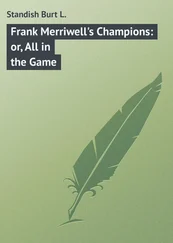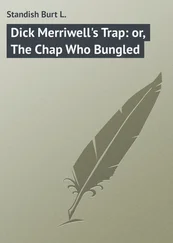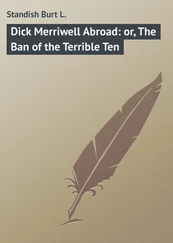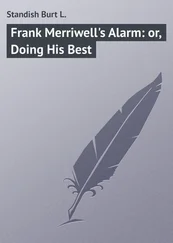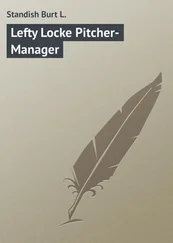Burt Standish - Frank Merriwell's Return to Yale
Здесь есть возможность читать онлайн «Burt Standish - Frank Merriwell's Return to Yale» — ознакомительный отрывок электронной книги совершенно бесплатно, а после прочтения отрывка купить полную версию. В некоторых случаях можно слушать аудио, скачать через торрент в формате fb2 и присутствует краткое содержание. Издательство: Иностранный паблик, Жанр: foreign_prose, foreign_children, на английском языке. Описание произведения, (предисловие) а так же отзывы посетителей доступны на портале библиотеки ЛибКат.
- Название:Frank Merriwell's Return to Yale
- Автор:
- Издательство:Иностранный паблик
- Жанр:
- Год:неизвестен
- ISBN:нет данных
- Рейтинг книги:3 / 5. Голосов: 1
-
Избранное:Добавить в избранное
- Отзывы:
-
Ваша оценка:
- 60
- 1
- 2
- 3
- 4
- 5
Frank Merriwell's Return to Yale: краткое содержание, описание и аннотация
Предлагаем к чтению аннотацию, описание, краткое содержание или предисловие (зависит от того, что написал сам автор книги «Frank Merriwell's Return to Yale»). Если вы не нашли необходимую информацию о книге — напишите в комментариях, мы постараемся отыскать её.
Frank Merriwell's Return to Yale — читать онлайн ознакомительный отрывок
Ниже представлен текст книги, разбитый по страницам. Система сохранения места последней прочитанной страницы, позволяет с удобством читать онлайн бесплатно книгу «Frank Merriwell's Return to Yale», без необходимости каждый раз заново искать на чём Вы остановились. Поставьте закладку, и сможете в любой момент перейти на страницу, на которой закончили чтение.
Интервал:
Закладка:
The college year had hardly begun before arrangements for this athletic meeting were under way.
As is usual in such matters, where the whole college is concerned, the management was given to a committee of upper classmen.
There were three on this committee, Jack Rowland, and Bed Hill from the senior class, and Frank from the junior.
It was not Frank's intention to take any active part in the contests, although he was well known throughout the college as a first-class, all-round athlete.
It seemed to him better that the contests against the other colleges should be made by those who were specialists in one line or another. He talked this matter over with his particular friends shortly after the term began.
"It won't seem quite right to see you out of it," protested Rattleton, "for when we had our sporting trip across the continent you were always coming in at the last minute to pull victory out of defeat, no matter whether we were jumping, running, playing ball or horse racing."
"That's another story," Frank replied. "When we were sporting it across the continent there were only nine of us, and we were not all Yale students at that. Here there are several hundred healthy men to choose from.
"I don't think there's much doubt that out of all the students now in college there is some one who could beat me at any one thing I might undertake to do, from wrestling to trapeze work."
"But," said Diamond, "if you should go into training for any one event, I think you'd come out on top."
"And that's what I don't care to do!" retorted Merriwell. "I'd rather be an all-round man than be able to do just one thing; I shouldn't know which to choose if I were to start in training."
"But we may lose a cup in some branch of sport if you don't go in."
"Oh, no, I think not. Besides that, there's going to be one event in which I can take a kind of share, and where perhaps I can be as useful to Yale as if I were contesting."
"What's that?"
"The tug of war."
"Is there going to be a tug of war?"
"Yes, siree!"
"Who's going to be on the team?"
"Will it be on cleats or on the level floor?"
"Will it be on the ground?"
These and many other questions of a similar kind were asked so rapidly that Frank had no chance for a reply. At length he explained that the team had not been chosen, and that anybody might be a candidate.
"The managing committee," he said, "has asked me to take charge of the training, and we're going to have trials in a corner of the gymnasium every afternoon. As soon as the team is made up, we shall get down to daily practice."
It was perfectly natural that the tug of war should arouse more interest throughout the college than any of the other events.
Of course it was important that one or another student should be in training to meet the best wrestler or jumper from the other colleges, but the tug of war was an event in which the whole college was represented.
There is never anything like a team event to arouse the enthusiasm of students.
A tug of war team consists of but four men, to be sure, but at that they are supposed to be, and generally are, the strongest men in the college, and so students of all classes looked to them for holding up the glory of the college.
There was another thing that made the tug of war team especially interesting at this time. For two or three years Princeton had been very successful in the tug of war, whether pulling against other colleges of against outside athletic organizations.
It had happened that three very strong men in a certain class had gone onto the team in their freshman year and had stayed there ever since.
That was greatly to the advantage of the Princeton team, for with three men on it who were perfectly used to each other, and who had had a great deal of experience, the team was not only powerful, but it made every other team afraid of it.
There is a great deal more in this than those who are not athletes imagine. A team that has the reputation of always winning is apt to strike terror to the hearts of its opponents and rattle them so that they cannot do their best.
Princeton naturally was very proud of its tug of war team and perfectly confident of carrying off the prize for that event. This was understood not only at Yale, but at Harvard and Cornell, and at each of these three colleges there was a determination to "down" Princeton if possible.
So it happened that when the managing committee at Yale announced that they would examine candidates for the tug of war team, there was so much interest in it that a perfect mob of students gathered at the gymnasium eager for a place upon the rope.
Rowland and Hill, the senior members of the committee, were inclined to dismiss the whole crowd and then quietly pick out four men according to their own judgment, but Merriwell opposed this policy.
"There may be perfect giants concealed in that crowd," he said, "and if there's only one, we want to discover him. Give them all a trial."
"But it would take weeks," exclaimed Hill, "to arrange those men in teams and make them pull against each other until we could sift out the best four!"
"I don't think we need to have them pull against each other to find out what they're worth," Frank responded.
"What other way is there?" asked Rowland.
"I have an idea that I can sift that crowd in a week."
"Well, then, you'd better try it."
So it was agreed that Frank should undertake to examine the candidates for the team, and to superintend its training.
His plan for examining the applicants caused a good deal of amusement at first, but it proved to be remarkably effective as well as a great time saver.
In a tug of war, as in many other sports, it is not only brute strength that tells, but quickness and skill. Frank believed a good deal more in the head work of tugging than he did in solid muscle.
"If a man can't drop right every time," he declared, "he isn't fit for the team. If he can drop right, he's got the making of a tugger."
To test this he had a rope fastened securely to a post, and the candidates in squads of four took hold of this rope and dropped half a dozen times at Frank's command. He gave brief explanations of what was necessary for them to do, to each squad before giving the word; then he watched the men go down, showing them where they had been in error and had them try again.
It took no more than half a dozen minutes for as many trials and then another squad was brought on.
In this way he easily tested from thirty to forty men an hour, and so in the course of three days had given every candidate for the team a chance.
After that it was an easy matter for him to strike off the list fully three-quarters of the candidates; that left from twenty to thirty who might still be useful.
These men he tried in groups of four also, but continually shifted the men from one group to another so as to find out which of them worked together to the best advantage.
At length, after ten days of patient examination in this way, he had Rowland and Hill come behind the screen and watch the efforts of six men who had been selected as the best team workers in the whole college.
The matter was discussed very frankly, not only by the members of the committee, but by the candidates themselves, for everybody was anxious that the best possible team should be selected and nobody would have been offended if he had been left off.
It was decided at last that Bruce Browning should be the anchor of the team. He had been Frank's choice almost from the start, for he was heavy and cool, and from past experience Frank knew that Bruce could be quick if it was necessary.
It is the anchor in a tug-of-war who does the head work for the team.
"I'd rather have a good anchor and three weak men," said Frank, emphatically, "than three giants on the rope directed by an anchor who is either excitable or slow."
Читать дальшеИнтервал:
Закладка:
Похожие книги на «Frank Merriwell's Return to Yale»
Представляем Вашему вниманию похожие книги на «Frank Merriwell's Return to Yale» списком для выбора. Мы отобрали схожую по названию и смыслу литературу в надежде предоставить читателям больше вариантов отыскать новые, интересные, ещё непрочитанные произведения.
Обсуждение, отзывы о книге «Frank Merriwell's Return to Yale» и просто собственные мнения читателей. Оставьте ваши комментарии, напишите, что Вы думаете о произведении, его смысле или главных героях. Укажите что конкретно понравилось, а что нет, и почему Вы так считаете.



